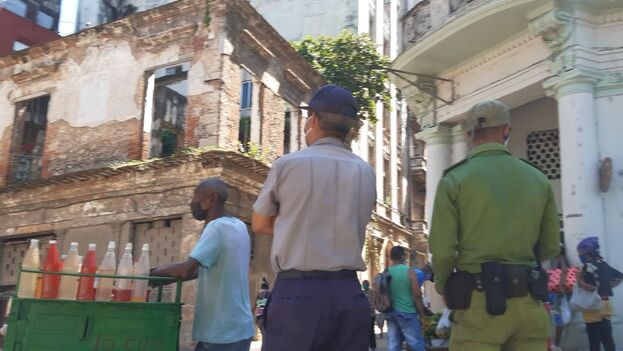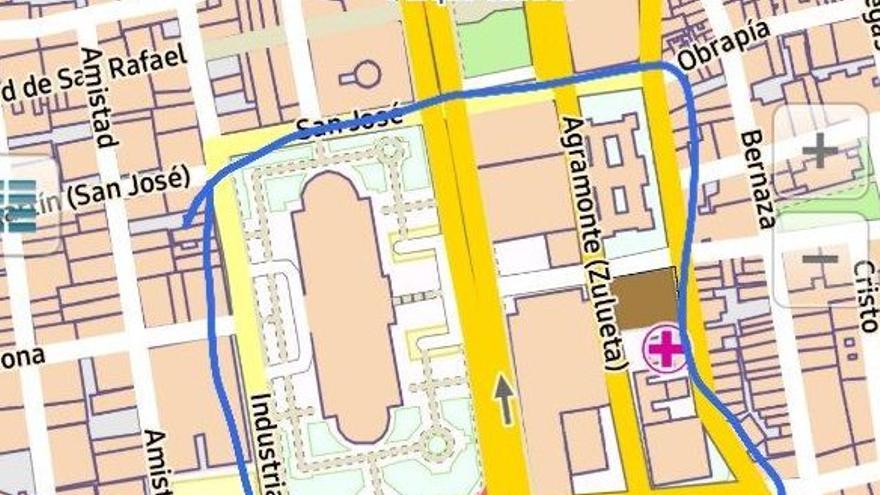
![]() 14ymedio, Natalia López Moya, Havana, 6 August 2021 — A strong police operation has surrounded the People’s Provincial Court of Havana since the early hours of this Friday morning, where several collective trials are being held against the 11th July protesters. With the deployment of troops, the authorities seek to avoid a protest by relatives in front of the facilities, located a few meters from the Capitol.
14ymedio, Natalia López Moya, Havana, 6 August 2021 — A strong police operation has surrounded the People’s Provincial Court of Havana since the early hours of this Friday morning, where several collective trials are being held against the 11th July protesters. With the deployment of troops, the authorities seek to avoid a protest by relatives in front of the facilities, located a few meters from the Capitol.
The security cordon around the court extends along a perimeter framed by Industria, San José, Dragones and Monserrate streets. Uniformed members of the National Revolutionary Police with dogs, military personnel and many members of the State Security make up the siege, according to 14ymedio.
In nearby Monserrate Street, this newspaper noted the presence of several relatives of the detainees who were surrounded by the security forces to prevent any contact between them.
“Today the oral hearing is being held for the group of boys who were at the 100th and Aldabó Station and who were later transferred to the penitentiary called Jóvenes de Occidente, in La Lisa,” a relative of one of the accused told 14ymedio.
“This hearing is like a new trial, with the defense of a lawyer,” he added and said that the family members are very anxious awaiting the decision of the judges. “I think there are the 10 or 12 young people who were called ’leaders’, in the words of the only ’witness’ there is, a sector chief, who spoke on the day of the first summary process where they sentenced the young people to 10 months in jail.”

“I passed by the corner of the Capitol and a police officer asked me for my identity card and searched my backpack,” a young man tells 14ymedio. “I didn’t even know what was happening, but later I found out that the trials were being held against those who protested in the streets; I knew it because a woman confirmed it to me at the bus stop.”
“I came to collect a habeas corpus and you cannot go within three blocks of the court,” another young woman told this newspaper.
Several state workplaces near the court suspended their working hours this Friday, among them the publisher Casa Editora Abril, which is located in the same building as the courtrooms, a building that once belonged to Diario de la Marina in the Cuban capital. The bookstore attached to this entity which has its door on the same corner did not open to the public this Friday, either.
“Since yesterday this has been very complicated, with a tremendous operation because they were going to bring the boys from the protests,” a neighbor from Teniente Rey Street comments to this newspaper. “They have not let any of the pushcart sellers set up nearby and they also have people posted on several balconies because they fear that the mothers of the detainees will make a protest.”
“Even a man who normally asks for money on the corner has had to move from the place because the police warned him that he could not be around there,” explains the woman. “Since the arrests this has happened several times, they bring a group of young people to stand trial and while they are holding the trials this area becomes a military camp, with uniforms everywhere.”
At a nearby bus stop, the comments of those who were waiting for the bus ranged from criticism of the official action to solidarity with the protesters. “They have more fear than money,” joked a young man in reference to the police, while an old woman showed her sorrow for those arrested on the day, whom she called “the poor boys of the 11th.”
Other passersby complained of difficulties walking in the area. “These people believe they own the country,” lamented a man who had to make a detour because he was not allowed to continue down the street in front of the court.
This week the official press reported that of the 62 people who have been tried for their participation in the demonstrations, 53 were sanctioned for public disorder and others for “resistance, contempt, instigation to commit a crime and harm,” according to data provided by Joselin Sánchez Hidalgo, magistrate of the People’s Supreme Court.
According to Sánchez, those who ended up in court did so for their “aggressive, violent and harmful” conduct and the crimes for which they were tried carry penalties of one year in prison, a fine of 300 ’shares’* or both. “In the case of the most violent or serious events that occurred on July 11, they are still under investigation and therefore have not reached the Court,” he added.
*Translator’s note: the Cuban Penal Code sets fines as a number of ’quotas’ or shares, with the value of one quota defined separately. In this way, all the fines can be changed by changing the value of one quota in a single place in the Code.
____________
COLLABORATE WITH OUR WORK: The 14ymedio team is committed to practicing serious journalism that reflects Cuba’s reality in all its depth. Thank you for joining us on this long journey. We invite you to continue supporting us by becoming a member of 14ymedio now. Together we can continue transforming journalism in Cuba.
